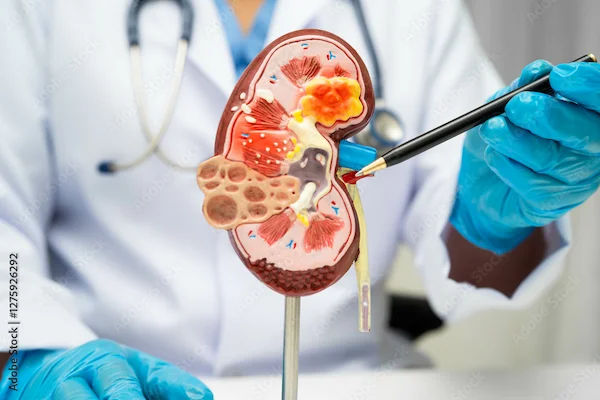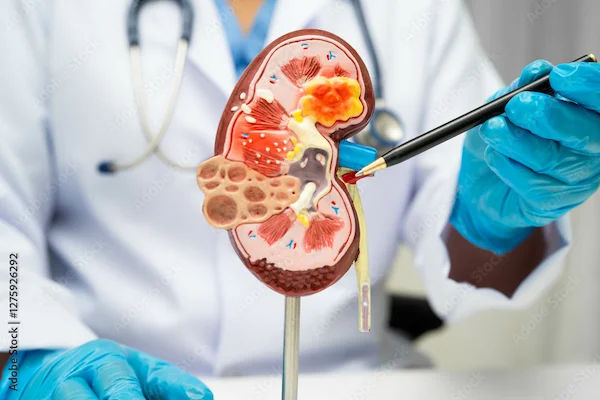Understanding Kidney Pain: Causes and Treatment Options
Learn about kidney pain and its common causes, symptoms, and effective treatment options. Find relief and get answers about kidney pain.

Written by
Last updated on 3rd Jul, 2025
Introduction
Kidney pain is a common concern for many individuals, and its causes can range from simple issues like dehydration to more serious conditions like kidney infections or tumours. If you’re experiencing discomfort in your lower back or sides, it’s important to understand what might be causing the pain and how it can be treated. In this article, we’ll explore the various causes of kidney pain, the symptoms associated with it, and the treatment options available to help you manage and alleviate the discomfort.
What Is Kidney Pain?
Kidney pain refers to discomfort or pain that occurs in the area of the kidneys, which are located in your lower back, on either side of your spine, just below the rib cage. The pain can be dull or sharp and may vary in intensity. Unlike back pain or muscle soreness, kidney pain usually stems from an issue affecting the kidneys themselves or the surrounding areas like the ureters or bladder.
Kidney pain is often a sign of an underlying medical condition, ranging from infections to kidney stones, and it can sometimes indicate more serious health concerns. It's important to pay attention to the type of pain, its location, and any accompanying symptoms so you can seek appropriate medical care.
Causes of Kidney Pain
Several conditions can cause kidney pain, and understanding these potential causes is essential for identifying the right treatment. Some common causes include:
Kidney Stones: One of the most frequent causes of kidney pain, kidney stones are hard deposits made of minerals and salts that form in the kidneys. When these stones move or block the urinary tract, they can cause severe pain, often described as sharp or cramp-like.
Kidney Infections (Pyelonephritis): A kidney infection is usually caused by bacteria that travel up the urinary tract. Symptoms often include pain in the back or side, fever, and painful urination. Kidney infections can become serious if not treated promptly.
Polycystic Kidney Disease (PKD): PKD is a genetic condition in which fluid-filled cysts develop in the kidneys. Over time, the kidneys enlarge and may cause pain or discomfort.
Urinary Tract Infections (UTIs): While UTIs typically cause pain in the bladder or urethra, they can spread to the kidneys, causing kidney pain. A UTI can lead to more severe conditions like a kidney infection if left untreated.
Trauma or Injury: Physical trauma or injury to the kidneys, such as from a car accident or fall, can lead to kidney pain. A kidney contusion (bruise) or more severe injury may require immediate medical attention.
Kidney Cancer: Although less common, kidney cancer can sometimes cause pain in the kidney area, often in the later stages of the disease when the tumour has grown significantly.
Kidney Stones and Hydronephrosis: Hydronephrosis occurs when a kidney is swollen due to the buildup of urine. It can result from a kidney stone obstructing the urinary tract, causing pressure and pain in the kidney.
Dehydration: Dehydration can lead to kidney discomfort and exacerbate existing kidney conditions. Not drinking enough water can negatively affect kidney function and cause pain, especially when the kidneys are unable to filter out waste products effectively.
Symptoms Associated with Kidney Pain
Some of the common symptoms that can occur with kidney pain include:
Painful Urination: A burning or painful sensation when urinating is common with infections or stones.
Blood in Urine (Hematuria): The presence of blood in the urine can indicate kidney stones, infection, or injury.
Fever and Chills: Fever, chills, and nausea often accompany kidney infections or serious kidney conditions.
Swelling or Edema: Kidney dysfunction can lead to fluid retention, causing swelling, particularly in the legs, ankles, or feet.
Changes in Urine Output: Decreased or increased urination, along with cloudy or foul-smelling urine, can suggest a kidney problem.
Consult Top Urologists
Treatment Options for Kidney Pain
The treatment for kidney pain depends on its underlying cause. Here are some common treatment options for various conditions:
Pain Management
Over-the-Counter Pain Relievers: Medications like ibuprofen (Advil, Motrin) and acetaminophen (Tylenol) can help alleviate mild to moderate kidney pain. These are often the first line of defence to provide immediate relief.
Prescription Pain Medications: For more severe pain, your healthcare provider may prescribe stronger pain medications, such as opioids. These should be used under strict medical supervision to avoid potential side effects and dependency.
Hydration
Drinking Water: Staying well-hydrated by drinking plenty of water helps prevent dehydration and supports kidney function. It can also help flush out waste and toxins from the kidneys, which is especially important for preventing kidney stones and infections.
Intravenous (IV) Fluids: In cases of severe dehydration or when oral hydration is insufficient, IV fluids may be administered to quickly restore hydration levels and support kidney function.
Antibiotics
Treatment for Infections: Bacterial infections, such as kidney infections (pyelonephritis) or urinary tract infections (UTIs), are treated with antibiotics. It's crucial to complete the full course of antibiotics as prescribed to ensure the infection is fully eradicated.
Intravenous Antibiotics: For severe infections that have progressed to the kidneys, stronger antibiotics may be administered intravenously in a hospital setting to effectively combat the infection and prevent complications.
Surgery or Lithotripsy
Kidney Stones: Larger kidney stones or other obstructions may require medical intervention:
Lithotripsy: This non-invasive procedure uses shockwaves to break up kidney stones into smaller pieces that can be passed more easily through the urinary tract.
Surgery: In some cases, surgical procedures like ureteroscopy or percutaneous nephrolithotomy may be necessary to remove larger stones or obstructions.
Dialysis or Kidney Transplantation
Dialysis: In severe cases of kidney disease or kidney failure, dialysis may be required. Dialysis is a procedure that filters waste and excess fluids from the blood when the kidneys are no longer able to perform this function effectively. There are two main types of dialysis:
Hemodialysis: Blood is filtered through a machine outside the body and then returned to the body.
Peritoneal Dialysis: The lining of the abdomen (peritoneum) is used to filter blood inside the body.
Kidney Transplantation: For individuals with end-stage kidney disease, a kidney transplant may be the best option. This involves surgically placing a healthy kidney from a donor into the patient's body to restore normal kidney function.
Lifestyle and Preventive Measures
Dietary Adjustments: Following a kidney-friendly diet can help manage symptoms and prevent further damage. This may include reducing sodium, potassium, and phosphorus intake.
Regular Check-Ups: Regular monitoring and check-ups with your healthcare provider are essential for managing kidney conditions and adjusting treatment plans as needed.
Healthy Lifestyle: Maintaining a healthy lifestyle, including regular exercise, a balanced diet, and avoiding smoking and excessive alcohol consumption, can support overall kidney health.
Conclusion
Kidney pain can be a symptom of various conditions affecting your kidneys and the surrounding structures. Understanding the causes and available treatment options is crucial for managing kidney pain and improving your quality of life. If you experience kidney pain, seek medical attention promptly to determine the underlying cause and receive appropriate treatment. With proper care and lifestyle adjustments, you can maintain healthy kidneys and prevent future kidney problems.
Consult Top Urologists
Consult Top Urologists

Dr. Sateesh Marriwada
Urologist
17 Years • MBBS, MS (General Surgery), Mch ( Genito Urinary Surgery)
Visakhapatnam
Apollo 24|7 Clinic - Andhra Pradesh, Visakhapatnam

Dr Tharaka Mourya Nutulapati
Urologist
7 Years • MBBS, MS (General Surgery), Mch ( Urology)
Visakhapatnam
Apollo 24|7 Clinic - Andhra Pradesh, Visakhapatnam

Dr. Prabir Basu
Urologist
19 Years • MBBS, MS General Surgery, DNB Genito-Urinary Surgery
Jodhpur Park
Dr. Prabir Basu urology clinic, Jodhpur Park
(125+ Patients)

Dr. Sandeep Maheswara Reddy Kallam
Urologist
6 Years • MBBS, MS (General Surgery), M Ch (Genito-Urinary Surgery), Post Doctoral Fellowship in Uro-Surgical Oncology
Visakhapatnam
Dr. SANDEEP MAHESWARA REDDY K _- best Urologist in visakhapatnam, Visakhapatnam
(250+ Patients)

Dr. Adittya K Sharma
Urologist
16 Years • MBBS MS MCH
Lucknow
Dr A K SHARMA, Lucknow
Consult Top Urologists

Dr. Sateesh Marriwada
Urologist
17 Years • MBBS, MS (General Surgery), Mch ( Genito Urinary Surgery)
Visakhapatnam
Apollo 24|7 Clinic - Andhra Pradesh, Visakhapatnam

Dr Tharaka Mourya Nutulapati
Urologist
7 Years • MBBS, MS (General Surgery), Mch ( Urology)
Visakhapatnam
Apollo 24|7 Clinic - Andhra Pradesh, Visakhapatnam

Dr. Prabir Basu
Urologist
19 Years • MBBS, MS General Surgery, DNB Genito-Urinary Surgery
Jodhpur Park
Dr. Prabir Basu urology clinic, Jodhpur Park
(125+ Patients)

Dr. Sandeep Maheswara Reddy Kallam
Urologist
6 Years • MBBS, MS (General Surgery), M Ch (Genito-Urinary Surgery), Post Doctoral Fellowship in Uro-Surgical Oncology
Visakhapatnam
Dr. SANDEEP MAHESWARA REDDY K _- best Urologist in visakhapatnam, Visakhapatnam
(250+ Patients)

Dr. Adittya K Sharma
Urologist
16 Years • MBBS MS MCH
Lucknow
Dr A K SHARMA, Lucknow



_12.webp)